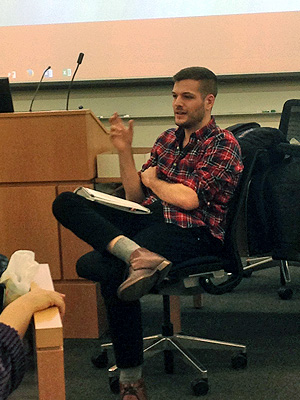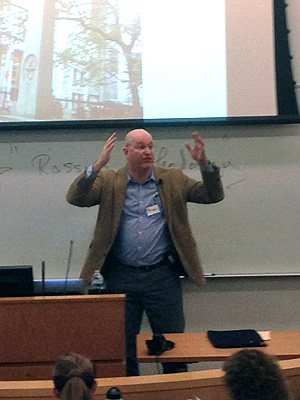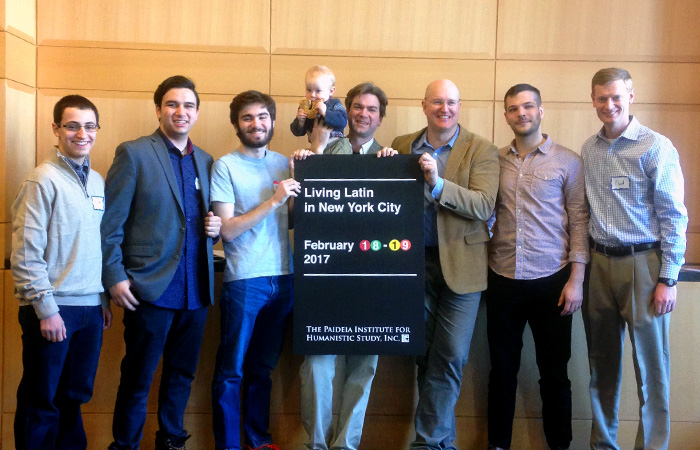Latin Alive at Regis and in New York City
Above: Regis alumni and current students gathered at Fordham University for the annual Living Latin in New York City conference, co-sponsored by Fordham and the Paideia Institute for the Humanities. Pictured (left to right) are Michael Fanelli '17, J.D. Calvelli '17, Kevin Donohue '17, John B. Kuhner '94 (with son, John S.), Matthew McGowan '89, Joseph Conlon '07, and David Bonagura '99.
"Mirabile dictu!" This was the reaction of Kevin Donohue '17 to the fifth annual Living Latin in New York City conference that was hosted by the Paideia Institute for the Humanities and Fordham University on February 18-19, 2017. The conference, believed to be the largest of its kind in the world, brought together over 200 participants to engage in a unique practice: speaking Latin. And among the participants were seven Regians spanning three decades, all united by their shared love for the Latin language.
 The Paideia Institute works to promote the use of "active Latin" teaching methods, which includes exercises in listening to and speaking Latin along with traditional reading activities. Latin teacher Mr. David Bonagura '99, who has attended all five Living Latin in New York City events, has found that students respond well to hearing Latin used in the classroom.
The Paideia Institute works to promote the use of "active Latin" teaching methods, which includes exercises in listening to and speaking Latin along with traditional reading activities. Latin teacher Mr. David Bonagura '99, who has attended all five Living Latin in New York City events, has found that students respond well to hearing Latin used in the classroom.
"The expectation is that people do not speak Latin anymore," said Bonagura. "So as soon as the students hear Latin spoken, they become excited to try their Latin skills in a new way." Bonagura has been employing a number of active Latin exercises that he has learned from the Paideia Institute in the classroom and in the bimonthly meetings of the Regis Classics Club.
(Pictured: Joseph Conlon '07 leads a group discussion of Tacitus—speaking in Latin.)
The conference featured opportunities for small groups to read a dozen different Latin authors from antiquity through the modern era and to talk about these readings in Latin. This year's selected authors included Plautus, St. Augustine, Heloise, Erasmus, and the 18th century Guatemalan-born Jesuit Raphael Landívar.
Michael Fanelli '17 found that these reading groups helped expand his comprehension in just a short time. "Speaking and translating Latin with the authors of Regis textbooks was both an incredible and a humbling experience."
In addition to the Latin reading groups, there were opportunities to hear several thirty minute lectures in three different languages—English, Latin, and ancient Greek—on topics ranging from Latin pedagogy, to the dozen Latin translations of Robinson Crusoe, to Latin inscriptions in New York City, to using modern Greek to learn and speak ancient Greek.
These last two lectures were given by Regians Dr. Matthew McGowan '89, who is the chair of the Classics Department at Fordham University, and Dr. Joseph Conlon '07, who teaches in Paideia's Latin and Greek summer programs for high school students. Colon, who studied Chinese at Regis before beginning his Latin and Greek studies in college, is also writing a Latin textbook under Paideia's auspices. In addition to these lectures, McGowan and Conlon led a number of the small group Latin discussions, as did John Kuhner '94, who is the president of SALVI, The North American Institute for Living Latin Studies.
 These alumni have shared their expertise and enthusiasm for Latin to current Regis students for years. McGowan has been a guest lecturer in Regis Latin classes in the past, and Kuhner, along with Dr. Patrick Burns '94, has led the Regis Classics Club's annual Bronx Zoo trip for the last two years. This past summer, senior J.D. Calvelli '17 spent two weeks in Rome under Conlon's tutelage as part of Paideia's Living Latin in Rome for High School Students program.
These alumni have shared their expertise and enthusiasm for Latin to current Regis students for years. McGowan has been a guest lecturer in Regis Latin classes in the past, and Kuhner, along with Dr. Patrick Burns '94, has led the Regis Classics Club's annual Bronx Zoo trip for the last two years. This past summer, senior J.D. Calvelli '17 spent two weeks in Rome under Conlon's tutelage as part of Paideia's Living Latin in Rome for High School Students program.
The Rome program, according to Calvelli, was "the hardest academic experience I've yet undertaken, but one of the most enjoyable, and by far the most rewarding. If it weren't for the Living Latin in Rome, I would probably not be interested in pursuing the Classics in college."
(Pictured: Matt McGowan '89 presents his collection of prominent Latin inscriptions on New York City landmarks.)
Reflecting on the weekend, Donohue thought the Paideia event was aptly named. "From the beginning to the end of the conference, the excitement and ardor of the speakers, lecturers, and attendants made Latin feel like a living, breathing thing among us—not just the work of old scholastics and dusty tomes."
The transgenerational connection among Latin-loving Regians was not lost on any of the current students present for the conference.
"Seeing former Regians so involved with the Classics gives me hope for the future," added Calvelli. "Maybe all those Latin phrases around the building, in our prayers, and in our mottos trains us Regians early for success in the Language, and fosters a true love for the Classical culture."
The older Regians in attendance along with the other participants all agree: Latin is not dead. It is immortal, and it still has a vivacious presence on 84th Street and beyond.
Read more Regis news
